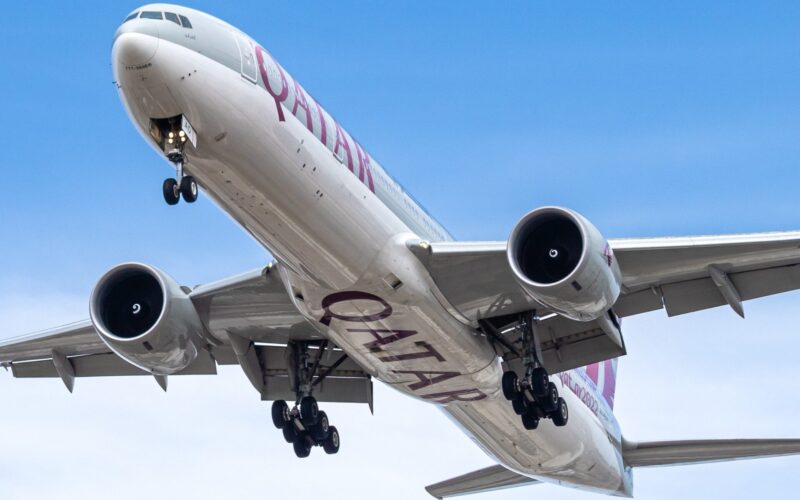Qatar Airways has filed an application with the Colombian aviation regulator, Aerocivil, to operate a twice-weekly service between Doha (DOH) and Bogotá (BOG).
According to the filed documents, which have been posted by Colombian media, Qatar Airways intends for this service to, then, continue to Caracas (CCS), Venezuela.
Qatar Airways would, thus, make use of Fourth Freedom rights to carry passengers from the Venezuelan capital on the return leg to Doha.
These services would be operated either by Boeing 777-300ER or Airbus A350-1000 aircraft.
This announcement comes six months after Qatar Airways’ competitor Emirates launched its own service to Bogotá from Dubai (DXB). In June 2024 the Emirati carrier launched daily flights to the Colombian capital as an extension of its Miami (MIA) service, using Boeing 777-300ER aircraft.
Turkish Airlines also operates to both Bogotá and Caracas from its hub in Istanbul (IST). In the case of the former, the aircraft then continues on to Panama City (PTY), while the latter is operated as an extension of its service to Havana (HAV).


8 comments
There is no valid reason for an age related retirement.
ICAO did extensive studies years back and found no medical reason for an age restriction.
However, the US congress made 65 the mandatory age of retirement, for no discernible reason,
ICAO put in an age related recommendation, going against its’ own research; that recommendation came when a relatively new member from a state which was trying to change the racial component of pilot ranks came into ICAO.
There are numerous persons well over the age of 65 who hold Class One Medicals and are fully competent, but are prevented from using their expertise by an arbitrary measure not supported by science.
Professional Pilots are the most monitored profession in the world; they are also the most continuously competent profession due to the continuous and rigorous monitoring of their health and competency.
End the arbitrary age limit; there is no reason for it, and it actually reduces safety in the industry.
I firmly believe that as long as pilots meet the required physical and mental fitness standards and continue to pass rigorous simulator checks and operational assessments, age should not be the sole determinant of their ability to fly. Competence, skill, and experience should be the primary measures of a pilot’s capability—not simply their age.
We all mature and age differently, and many professionals demonstrate exceptional performance well into their later years. For instance, my GP is in his 80s, yet I trust him implicitly with my health, as his experience and knowledge are invaluable. Similarly, in aviation, highly skilled and experienced pilots bring unique insights and expertise that cannot be easily replaced. Their continued presence in the cockpit not only enhances safety but also ensures they can mentor and train the next generation of aviators, passing on critical skills and real-world knowledge that can’t be taught solely in a classroom.
In the UK, pilots can take early retirement from the age of 55 but are required to stop flying by 65, even though the state pension age is currently 67. This disconnect highlights an opportunity to reassess age restrictions and align them with modern realities. Allowing skilled and capable pilots to continue flying beyond 65—provided they meet stringent fitness and competency standards—would be a step toward addressing pilot shortages and preserving a wealth of experience for the benefit of the entire industry.
Skilled pilots are not just operators of aircraft; they are role models, teachers, and mentors. Ensuring their ability to contribute for as long as they are fit to do so is vital for fostering the development of future pilots and maintaining the highest standards of aviation excellence.
I got tossed aside at 65, right at the top of my game with over 10,000 hrs in the left seat of the 747. As a crew we certainly faced numerous scenarios that weren’t “in the book” and sometimes there is no tool as valuable as experience and genuine flying skill. It’s certainly not a safety issue as we have to pass the same check rides and medical evaluations!
What NEEDS to happen is to use the seniors, retired from cockpits, to TEACH the upcoming youngsters from their accumulated experiences. As we age, our reflexes slow, not so good in a cockpit crisis! But don’t waste all that accumulated experience either. Older pilots all have their techniques for passing experiential knowledge along; they’d been doing it in cockpits for yrs; USE that still, just not in passenger flight cockpits. Cargo flights, okay, while they can still pass the physicals, and ground school, including simulators, absolutely.
You have no idea what you are talking about.
Please explain the context “reflexes in a cockpit crisis”. We are not talking about fighter pilot responses. We are talking about measured cognitive processes, similar to those of surgeons of the same age! As Chris Pohl mentions. If we pass rigorous sim checks and medical checks why not continue?
Me as a Comercial Helicopter pilot appreciate the Senators above, so hope to recieve best news soon.
I firmly believe that as long as pilots meet the required physical and mental fitness standards and continue to pass rigorous simulator checks and operational assessments, age should not be the sole determinant of their ability to fly. Competence, skill, and experience should be the primary measures of a pilot’s capability—not simply their age.